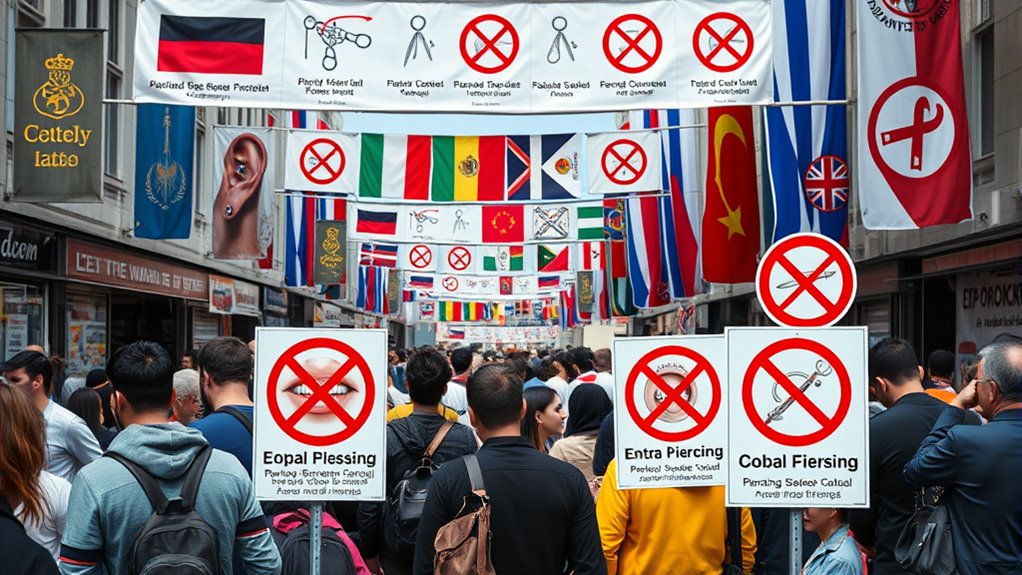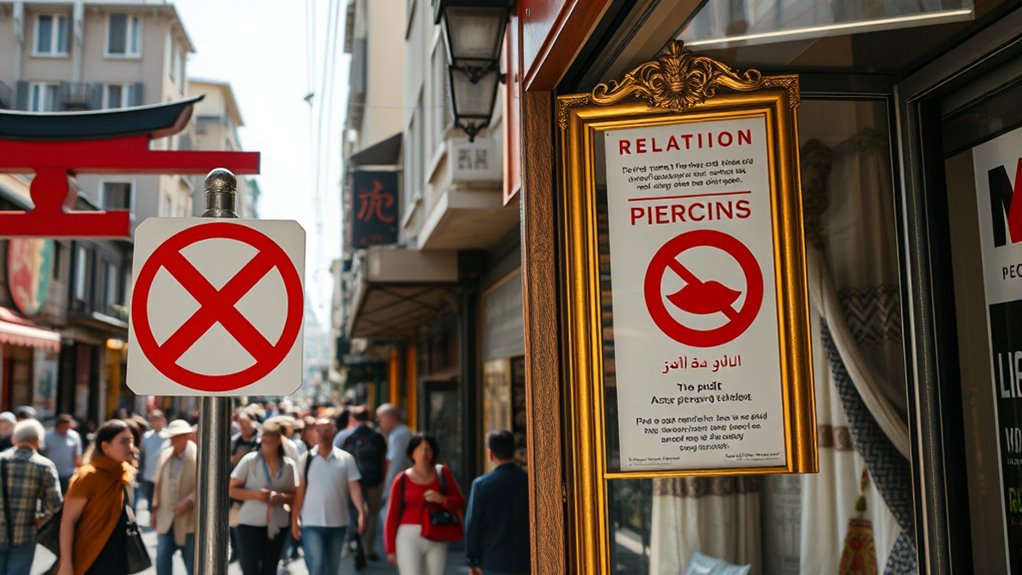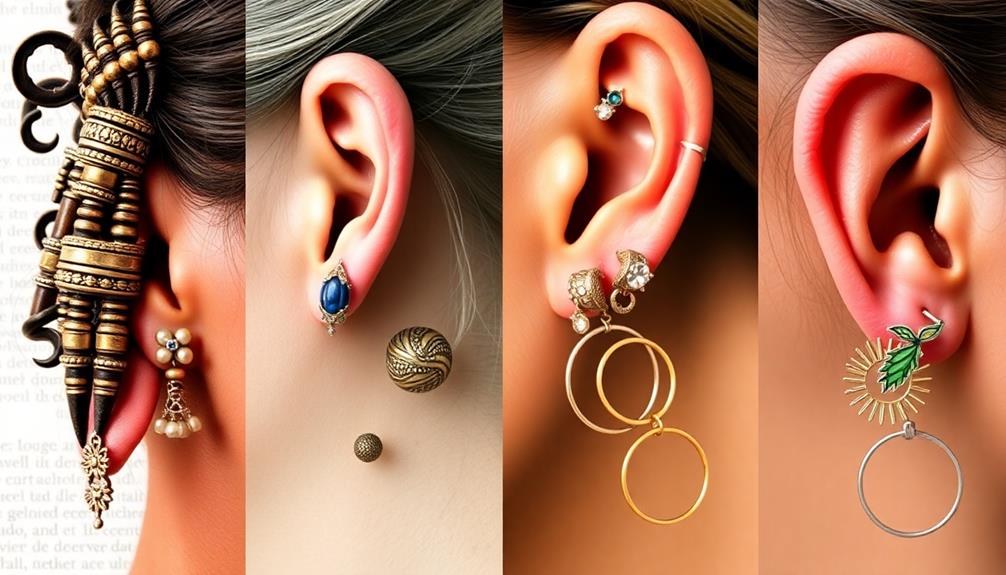Piercing laws and restrictions vary widely across countries, influenced by cultural norms and safety concerns. Some nations require licenses, set age limits, or ban certain types of piercings altogether. Others have strict hygiene standards to protect public health. Understanding local regulations helps you avoid legal issues and health risks. If you keep exploring, you’ll discover specific rules and cultural attitudes that impact your body modification plans worldwide.
Key Takeaways
- Laws vary widely, with some countries requiring licensed practitioners and strict age restrictions for piercings.
- Certain countries ban specific types of piercings, especially extreme or body modifications deemed risky or culturally inappropriate.
- Regulations emphasize hygiene standards and sterilization, with penalties for non-compliance to ensure public safety.
- Cultural norms influence the acceptance and availability of piercing services, affecting legal restrictions and social perceptions.
- Travelers should research local laws and cultural attitudes to avoid legal issues and ensure safe piercing practices abroad.

Piercing regulations vary widely across countries, reflecting differing cultural norms, safety standards, and legal frameworks. In some regions, piercing is embraced as a form of self-expression and is widely accepted within society, while in others, it faces notable restrictions due to cultural or religious beliefs. When you consider getting a piercing abroad, it’s vital to understand how cultural acceptance influences local laws. For example, in countries with progressive attitudes toward body modifications, piercing shops are common, and regulations tend to focus mainly on hygiene standards. Conversely, in more conservative societies, piercing might be viewed with suspicion or disapproval, leading to stricter rules or outright bans. These cultural perspectives shape not only the availability of piercing services but also the overall environment you’ll encounter.
Cultural norms greatly influence piercing laws and acceptance worldwide.
Legal consequences play an essential role in how piercing is regulated in different nations. Laws can dictate who is permitted to perform piercings, the age restrictions involved, and the types of piercings allowed. For instance, some countries require piercers to hold specific licenses or certifications, and failure to comply can lead to fines, legal action, or even imprisonment. You might face penalties if you attempt to get a piercing from unlicensed practitioners or if you’re underage without proper consent. Additionally, certain types of piercings, particularly those deemed extreme or risky, could be prohibited altogether, with violators risking legal repercussions. Understanding these legal nuances ensures you avoid unintentionally breaking the law and facing serious consequences.
In many places, regulations are also designed to protect public health and safety. This means strict hygiene standards, sterilization procedures, and age restrictions are enforced to prevent infections and other health risks. If you’re traveling, it’s wise to research local laws to find reputable piercing studios that comply with these regulations. Ignoring local rules might not only jeopardize your health but also lead to legal trouble, especially if authorities suspect violations.
Cultural acceptance and legal consequences are interconnected and greatly influence whether piercing is accessible or heavily restricted in a given country. You need to be aware of these factors to navigate the legal landscape effectively. Before getting pierced abroad, check local laws and cultural attitudes to guarantee your safety and avoid legal issues. Doing so guarantees that your experience remains positive and respectful of the local customs and regulations, making your body modification journey safe, legal, and in harmony with the society you’re in.
Frequently Asked Questions
Are There Age Restrictions for Piercings Worldwide?
You’ll find age restrictions for piercings vary worldwide, but generally, minors need parental consent, and many places set a minimum age, often around 16 or 18. Follow proper piercing etiquette by respecting local laws and shop policies, especially regarding tattoo restrictions and age limits. Always check specific country or state regulations before getting pierced to guarantee you’re compliant and avoid legal issues or health risks.
How Do Cultural Beliefs Influence Piercing Laws?
Cultural beliefs shape piercing laws more than you might think, often reflecting deep-rooted traditional practices or cultural taboos. In some societies, piercings symbolize rites of passage, so laws are more lenient to honor these customs. Conversely, other cultures see certain piercings as disrespectful or taboo, leading to stricter regulations. It’s like walking on eggshells—laws adapt to cultural nuances, ensuring respect for local traditions and beliefs.
Are There Specific Health Standards for Piercing Salons Internationally?
You’ll find that many countries have specific health standards for piercing salons, including strict sterilization standards to prevent infections. Certification requirements are often in place, ensuring practitioners are trained and qualified. These standards emphasize using sterile equipment and proper hygiene practices. Always check local regulations before getting pierced to ensure the salon meets the required health standards, safeguarding your health and reducing risks.
Can Foreigners Get Piercings Without Legal Issues?
Yes, you can get piercings without legal issues, but it depends on the country’s cultural acceptance and tattoo regulations. Many places welcome foreigners for piercings, yet some have strict rules or require age verification. Always research local laws beforehand, visit reputable salons, and make sure they follow health standards. Respect local customs and regulations to avoid problems, and you’ll have a smooth experience getting your piercing abroad.
How Do Religious Practices Impact Piercing Regulations?
Religious practices substantially impact piercing regulations, especially when religious attire or ceremonial piercing is involved. You might find that some countries permit certain piercings for religious reasons, like nose or ear piercings during ceremonies, while others restrict them to preserve cultural traditions. Always check local laws beforehand, as authorities may have strict rules about religious or ceremonial piercing, and failing to comply could lead to legal issues.
Conclusion
So, next time you think about piercing, remember that while some countries ban or heavily regulate it, others embrace it freely. You might find it ironic that what’s considered an art form in one place is a crime in another. But hey, don’t let the rules dull your sparkle—just be sure to check the laws first. After all, a little regulation might keep your body art from turning into an international incident.
















